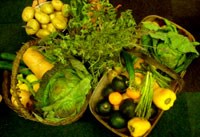
Top stories


ESG & Sustainability#BudgetSpeech2026: SRD grant unchanged, other Sassa social grants see hike
9 hours



More news












ESG & Sustainability
South Africa’s carbon tax should stay: climate scientists explain why










The Academy of Science of SA (ASSAf), established in 1996 through an act of parliament, says in a comprehensive report that GM technology "can contribute to the resolution of the African food shortage".
But the report stresses the necessity of "a framework of appropriate biotechnology with sufficient financing for human capital development, construction and equipping of necessary laboratories, and the use of rigorously planned, results-oriented GM food research".
It says its research has shown that the technology can increase yields and improve the storage potential of crops and the protein content of starchy foods.
The report says GM technology also offers opportunities for the biofortification of local foods and improving their "functional potential".
ASSAf says the report results from a study that engaged African scientists in assessing the challenges, opportunities and risks associated with GM organisms.
It was undertaken in collaboration with the Union of German Academies of Sciences & Humanities, the Network of African Science Academies and the Uganda National Academy of Sciences.
Noting "widespread scepticism" about the value of GM crops, the report says that though SA is the leader of GM technology in Africa, its adoption in the country has been slowing due to continuing arguments about its value.
Africa is the only continent where per capita food production is decreasing. Hunger and malnutrition affect one in three Africans.
SA, Egypt and Burkina Faso are the only three African countries producing commercial GM crops.
The debate over GM technology has raged globally and in SA for many years.
It has been controversial enough to bedevil trade in agricultural products between major trading blocs such as the US and the EU. And some African countries have refused food aid because they will not allow genetically modified food to cross their borders.
For most SA consumers, arguments between the two camps have tended to cancel each other out, despite the adoption of GM technology by many farmers and legislators.
ASSAf's green light for the technology is therefore an important development in the debate, though it still leaves many in the anti-GM lobby unconvinced.
Mariam Mayet, founder of the Johannesburg-based African Centre for Biosafety, says the technology's capacity to increase yields over a short term is not disputed, but it is not sustainable.
"It depends on pesticides and artificial fertilisers and it is an energy-intensive agriculture system which harms the soil," she says.
Mayet admits that ASSAf's credentials "seem impressive" but says the pro-GM camp has been "extremely good at controlling bureaucrats and lobbying governments.
"It's more of the same we've had from them. The whole point is that we must use land sustainably or we're doomed."
But ASSAf's report maintains that "locally focused GM technology can play a role in ... sustainable crop production systems that also conserve biodiversity", and can alleviate poverty and hunger, augment traditional plant breeding and reduce the environmental footprint of agriculture.
"It can mitigate climate change, reduce greenhouse gas emissions and contribute to the cost-effective production of biofuel," the report says.
Source: Financial Mail

For more than two decades, I-Net Bridge has been one of South Africa’s preferred electronic providers of innovative solutions, data of the highest calibre, reliable platforms and excellent supporting systems. Our products include workstations, web applications and data feeds packaged with in-depth news and powerful analytical tools empowering clients to make meaningful decisions.
We pride ourselves on our wide variety of in-house skills, encompassing multiple platforms and applications. These skills enable us to not only function as a first class facility, but also design, implement and support all our client needs at a level that confirms I-Net Bridge a leader in its field.
Go to: http://www.inet.co.za